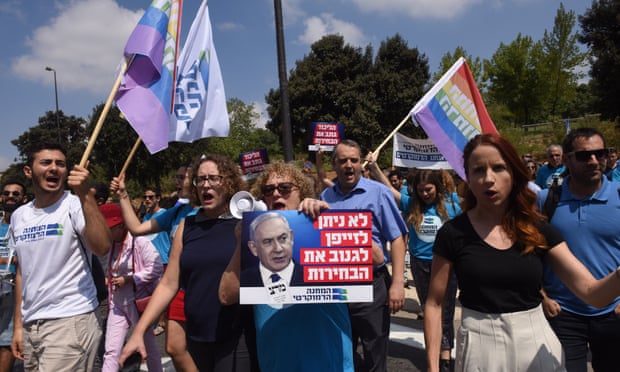by Keren Setton
JERUSALEM, Sept 14 (NNN-XINHUA) – Israelis will head to the polls for the second time this year on Sept 17, a situation that has never occurred in the country’s history, hoping that deadlock will be avoided and a government will be formed.
Almost six million Israelis are eligible to vote for the general election this time.
Five months ago, Prime Minister, Benjamin Netanyahu, was not able to form a coalition government, after the first election. He dissolved the Israeli parliament, the Knesset, and thus another election was scheduled.
In the last election, Netanyahu’s Likud party secured 35 mandates out of 120 Knesset seats. Centrist party Blue and White, led by Benny Gantz, also got 35 mandates, which made coalition forming difficult, and thus an unfulfilled task for the Israeli prime minister.
But just within a few months, will there be any change? While there have been some personnel shifts in the parties, have Israelis moved from one ideological bloc to another?
“It will be the same, in terms of the two blocs being unable to form a 61 mandate government, and in that perspective, it might very likely be the same, in terms of being unable to create a government,” said Gayle Tal Shir, a scholar in the department of Political Science at the Hebrew University.
During the last election, Avigdor Lieberman, once a political ally of Netanyahu, put the main hurdle in front of forming a right-wing government.
As head of the hawkish Yisrael Beitenu party, Lieberman was at odds with Netanyahu’s policies on state-religion relations, and passed up Netanyahu’s offer of the defence minister position, leading the nation into another election campaign.
Lieberman and his party are currently polling at between eight and 10 mandates, making him the potential kingmaker of these current elections. With the blocs being almost equal, his mandates will probably go to the highest bidder.
This election, like the previous one, is largely a referendum on Netanyahu and his legacy. Seeking his 5th consecutive term and currently Israel’s longest serving prime minister, the Likud leader’s last years have been marred by corruption allegations.
Netanyahu’s pretrial, to determine whether he will be indicted, will be held in the beginning of Oct and might have great impact on coalition negotiations.
In the previous campaign, he said, he was not seeking to promote an immunity law that would keep him out of the courtroom, as long as he was in power. But once negotiations began, it was clear that the bill was important to Netanyahu.
“It’s clear that Netanyahu is trying to manipulate the legal system, in order to exempt him from trial,” Tal Shir, added.
Hagay Cohen voted for the Likud in Apr, but is now debating whether to vote, because he is angry at the country’s prime minister.
Another election is “a waste of money and I disagree with Netanyahu’s insistence on the immunity law,” Cohen said.
“There is no one else who can replace him,” said Eli Yehoshua, a young voter, echoing a sentiment of many young voters, who traditionally vote for the right and do not have recollection of Israel without Netanyahu at its helm.
Gantz, who is Netanyahu’s main rival, said, he is willing to form a government with the Likud but with a different party leader. Blue and White party members have campaigned against Netanyahu’s alleged corruption vehemently, saying, they will not sit in the same coalition with a corrupt leader.
Likud has been steadfast in its support for Netanyahu, however, with the understanding that the Israeli prime minister might be an impediment and not an asset, this support is gradually wavering in recent weeks.
Only if the right bloc has a clear margin of victory will Netanyahu’s legal troubles be sidelined.
According to Israeli law, a sitting prime minister is not obligated to resign if indicted, and can stay in power until a final supreme court ruling is handed down.
There is no other alternatives for Netanyahu’s supporters and other right-wingers, regardless of corruption allegations and other criticisms.
What will be the critical figure in the upcoming elections is the voter turnout. With nearly 68-percent turnout in Apr, it is likely that the number will be lower this time. This will change the division of the mandates among the parties, who need to pass 3.25 percent of the threshold in order to enter the Knesset.
The smaller parties, on either bloc, have the potential of changing the division and shaping the future government of Israel, because the Israeli political system is based on coalition government. It will be weeks until the dust settles and a clear picture of the political future emerges.– NNN-XINHUA






